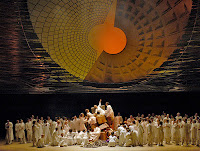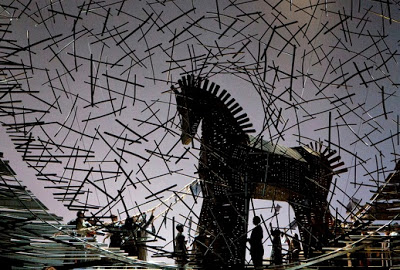This past week we saw Les Troyens at the Met. At just over five hours, it was by far the longest evening at the opera either of us had ever experienced. Shockingly, we both stayed awake the entire time.
 Les Troyens is the story of the fall of Troy to the Greeks, the escape from Troy of the Trojan hero Aeneas and his small army, their arrival in the safe haven of Carthage, Aeneas’ love affair with Dido the Queen of Carthage and finally his abandonment of Dido to go to Italy and found Rome as the ghost of the Trojan hero Hector has instructed him to do. Thusly setting in motion not only the founding of Rome but also the Punic Wars between Rome and Carthage nearly one thousand years later.
Les Troyens is the story of the fall of Troy to the Greeks, the escape from Troy of the Trojan hero Aeneas and his small army, their arrival in the safe haven of Carthage, Aeneas’ love affair with Dido the Queen of Carthage and finally his abandonment of Dido to go to Italy and found Rome as the ghost of the Trojan hero Hector has instructed him to do. Thusly setting in motion not only the founding of Rome but also the Punic Wars between Rome and Carthage nearly one thousand years later.
That’s a lot to fit into five hours, especially with all the ballet in the piece. It actually felt as if there was more ballet in this opera than in your average ballet. Small wonder that Les Troyens was originally shown as just the last three acts in 1864 and only later in 1890 (after Belioz’s death incidentally) was the entire piece performed over TWO nights.
The most bizarrely memorable image of the First Act, and perhaps the opera was that of a man wearing a diaper strapped inside a large wheel being rolled around the stage. I know that it was supposed to be a restrained Greek prisoner being taunted by the Trojan people but I just couldn’t help thinking it was some weird gay BDSM thing. We have binoculars. It was a man in a diaper and a helmet strapped inside a wheel. I swear.
 Everything got even stranger in Act III. Somehow Carthage is Happy White Japanese Pant Suit World with the only other accessory being bright purple kimonos. Also Dido’s weird Jabba the Hutt throne was really distracting. I think it was meant to be a miniature diorama of the city of Carthage but it just looked awkward and bulky and dangerous to walk on. And sadly, the mezzo sprawled out on the throne only reinforced the Jabba the Hutt imagery.
Everything got even stranger in Act III. Somehow Carthage is Happy White Japanese Pant Suit World with the only other accessory being bright purple kimonos. Also Dido’s weird Jabba the Hutt throne was really distracting. I think it was meant to be a miniature diorama of the city of Carthage but it just looked awkward and bulky and dangerous to walk on. And sadly, the mezzo sprawled out on the throne only reinforced the Jabba the Hutt imagery.
After the approximately 30 minute continuous ballet sequence in Act III, we guestimated there was at least an hour of pure ballet in Les Troyens. Which would make for a little over 3 hours of pure opera with the ballet edited out. Far more manageable and you wouldn’t need two nights to do it. I think the main item of interest in the ballet sequences is their historical significance. Apparently in France, Parisian audiences of the day were meant to eat and go to the bathroom during these extended dance sequences. Two things I would have loved to be doing during much of those thirty minutes.
 Re-caffeinated and ready for the last Act, we realized the choral pieces were riveting, at least, we found. The Met chorus is often overlooked and taken for granted by the audience but here they shone brightly. Not just their singing which was lovely but strangely enough their acting and stage deportment. They switch from Trojans to suicidal virgins to pillaging Greeks to Carthaginians and back to Trojans again. All this while singing beautifully and navigating supers and dancers and huge choreographed action and set pieces on stage. It was hard to tell who were the dancers, the supers or the choristers as they wove in and out of each other. Which is the point no? They were truly thrilling.
Re-caffeinated and ready for the last Act, we realized the choral pieces were riveting, at least, we found. The Met chorus is often overlooked and taken for granted by the audience but here they shone brightly. Not just their singing which was lovely but strangely enough their acting and stage deportment. They switch from Trojans to suicidal virgins to pillaging Greeks to Carthaginians and back to Trojans again. All this while singing beautifully and navigating supers and dancers and huge choreographed action and set pieces on stage. It was hard to tell who were the dancers, the supers or the choristers as they wove in and out of each other. Which is the point no? They were truly thrilling.
 Susan Graham canceled the night we went which was very disappointing to us as we came to see her in part, although her replacement Elizabeth Bishop performed admirably. The bass Kwangchul Youn was excellent as well. Both were very well received by the audience.
Susan Graham canceled the night we went which was very disappointing to us as we came to see her in part, although her replacement Elizabeth Bishop performed admirably. The bass Kwangchul Youn was excellent as well. Both were very well received by the audience.
The Tenor Bryan Hymel, who took over last minute when Marcello Giordani withdrew from the final four Les Troyens performances and retired the role of Aeneas from his repertory, was excellent. The most striking and affecting vocal moments of the evening all belonged to him. If the audiences reaction to his curtain call is any indication, he could become a great big star. And holy cow opera needs some thrilling, goose bump inducing new vocal stars right now.
-Elizabeth Frayer and Shawn E Milnes
Related Articles:
Twiddling Dials and Bulging Biceps: The Metropolitan Opera Renovations
You, In This Tomb?: Aida at the Metropolitan Opera
Zoot Suits, Broadswords and Benny Hill: Ballo at the Metropolitan Opera



Couldn’t agree more with Elizabeth and Shawn. The costumes were drippy and the ballets were much too long. to make matters worse, there was a stage malfunction the night we attended and the first intermission extended from 20 minutes to closer to 40 minutes! However, despite these distractions, it was a thrilling evening of opera. The chorus really was superb and we were fortunate enough to hear the lovely Susan Graham and the new tenor, Bryan Hymel, the evening we attended.
“Apparently in France, Parisian audiences of the day were meant to eat and go to the bathroom during these extended dance sequences.”
I believe you have this backwards. The ballets were usually written in the middle of opera so that the wealthy, who were more interested in the dance than the rest of the opera, could eat their regularly scheduled meals then show up at the start of Act II to be seated and not miss the ballet. In fact, Tannhauser was booed for having its ballet in the first act, forcing the patrons to actually eat early (or late) just to get to the opera in time for the curtain (the horror!).
Otherwise, I thought the staging was fine, you really missed out on Susan Graham (quite a great Didon), and I was overjoyed to see that Giordani has finally realized he’s not right for the part of Énée (Hymel was fantastic, his Act V aria was truly breathtaking). Voigt was a disappointment as Cassandre, although Croft was excellent as always opposite her as Chorèbe. Les Troyens is possibly the most criminally underperformed and underrated operas, one of my favorites and features some absolutely arresting music. It was great to finally see it staged live (only seen/heard concert versions and video recordings).
It is a shame that the focus of so much of this piece was of a 2 minute (and admittedly silly) side show spectacle. No mention is made of the musical aspects of the performance (ie the orchestra, choir and soloists) until after the comments about the other patrons, the coffee bar scene. Not until the last 3 paragraphs.
Was this supposed to be a review of an opera performance or just impressions of a night out on the town?
If the authors were trying to pass as opera neophytes, they surely convinced me. I hope for their sake and anyone who depends on them for a living that they don’t list “music critic” on their CV’s.
Someone who had experienced this work before would surely have seen that this performance raised the bar in a big way. Nothing in art is perfect. I would love to have heard the brass play out more, for example, but I guess you have to see badly staged and performed opera before you can recognise well staged and performed opera. Maybe that is what the reviewers are missing.
Bryan Hemel is clearly destined to own the role of Anaeas. He certainly hit it out of the park. However, so did Eric Cutler as Iopas and Paul Appleby as Hylas. Both deserve to share the credit with Hemel. All 3 were inspirational.
Also completely omitted was the music and the orchestra itself. Les Troyens is an opera. It is not a stage play, and it is not a ballet. Operas have 1) Orchestral music 2) Singing. So what was the point of this piece in the first place? In this omission, the reviewers did a huge injustice to one of, if not THE best orchestras going today.
One can quibble with opinions of costumes and choreography. As we say, there is a reason why the now-departed Howard Johnson Restaurants offered 28 flavors of ice cream. But to not mention the music and singing at all until 2/3 of the way through the piece is hard to understand.